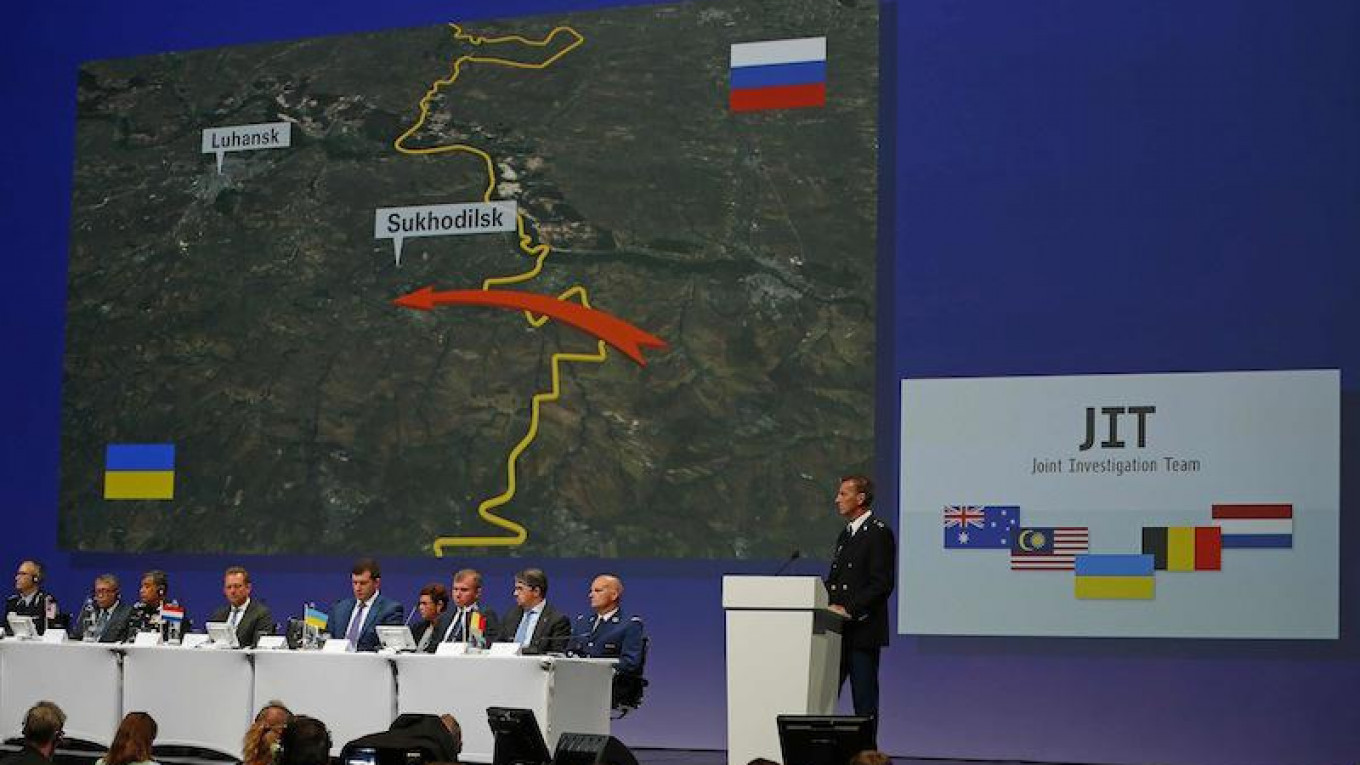As a Dutch-led investigation team on Wednesday provided further evidence of Russia's role in the fatal crash of Flight MH17, Moscow is not budging an inch in dismissing all claims of its involvement as politicized.
Among the most important conclusions presented by the Joint Investigation Team (JIT) in a press conference today was that the Buk surface-to-air missile system responsible for the deaths of 298 people was brought into eastern Ukraine from Russia.
After the Buk was used to bring down the Boeing passenger plane en route to Kuala Lumpur on July 17, 2014 (which, evidence suggests, was mistaken for a Ukrainian transport plane), it was returned to Russia, the JIT said.
Investigators from the Netherlands, Australia, Belgium, Malaysia, and Ukraine also pinpointed the launch site of the fatal missile to a field in Pervomaysk, six kilometers south of the Ukrainian village of Snizhne, which they say was under the control of pro-Russian separatists at the time.
The investigation team cites evidence obtained from around 150,000 mobile phone records, videos, and witness accounts. Moscow, however, claimed to be “disappointed” with the results, continuing its line of rejecting any hint of Russian involvement in the crash as politicized.
“To name a guilty party arbitrarily and make up the desired results has become the norm for our Western colleagues,” Foreign Ministry spokeswoman Maria Zakharova said in an online statement. “It makes you want to ask: how much more?”
Chair of the Duma's foreign affairs committee Leonid Slutsky described the JIT's findings as “heavily politicized.”
“I don't believe a single one of these assertions,” he told the RIA Novosti agency. “These conclusions serve only one [goal]: to marginalize Russia further in the global political and informational spheres.”
In separatist-controlled eastern Ukraine, the JIT's report was discarded as an American plot.
“It is the Americans who were first to say the plane was downed from territory supposedly under separatist control, saying they had radar images. Two years have passed, and no one has seen these images,” Eduard Basurin, a military commander in the self-proclaimed Donetsk People's Republic told the Govorit Moskva radio station. “This is deception; they're lying,” he said.
In the Russian media, the JIT's findings were widely misrepresented and in some cases news outlets conveniently omitted information altogether about the Buk having originated in Russia and returned across the border after the plane crash.
A headline published by the pro-Kremlin Lifenews.ru tabloid, for example, read: “Dutch General Prosecutors Don't Tie Russia to MH17 Crash.” The article went on to explain: “Prosecutors can't officially confirm the link between Russia or Russian citizens [with the crash].”
Another headline by the state-run news agency Ria Novosti read: “Dutch Prosecutors Don't Officially Tie MH17 Crash to Russian Acts or Russian Citizens.”
A Long Haul
The JIT on Wednesday mostly confirmed previous findings by the Dutch Safety Board and the Bellingcat open-source investigation collective.
Yet it is seen as a crucial step by the relatives of the victims in bringing to justice those responsible for the crash. Though the JIT will continue its investigation, all evidence points to Russia, says Evert Wytema, a spokesperson for 30 of the victims.
“It provided a solid factual base for what everyone was already thinking — that the Buk came from Russia and was therefore under Russian command,” he said in a phone conversation. “From the very first moment, the top of the Russian leadership, including President Vladimir Putin, must have known about this.”
Investigators say they have identified around 100 people connected to either the transportation or the launch of the Buk missile, but refused to make their names public or specify to what degree they were connected to Russia.
Until the identities are made public, Russia is relatively safe from possible legal or political retribution, says Tony van der Togt of the Dutch Clingendael Institute. But the respite could be temporary. “As soon as the JIT provides hard evidence, The Hague will have to respond,” he says.
No one doubts that getting Russia to cooperate with the prosecution of some of its own citizens will be difficult, if not impossible. That would force the Dutch to ramp up pressure and maybe even issue new sanctions, says Van der Togt.
“For now, The Hague is trying to evade that question and play for time,” he says.
It has at least until 2018, which is when the Joint Investigation Team is planning to complete its investigation. Expectations are, however, that the case could turn into a “Lockerbie-like scenario,” says Wytema, referring to the decades-long attempts to bring to justice the Libyan suspects of a plane bombing over Scotland.
“We're in for a long haul,” he says.
A Message from The Moscow Times:
Dear readers,
We are facing unprecedented challenges. Russia's Prosecutor General's Office has designated The Moscow Times as an "undesirable" organization, criminalizing our work and putting our staff at risk of prosecution. This follows our earlier unjust labeling as a "foreign agent."
These actions are direct attempts to silence independent journalism in Russia. The authorities claim our work "discredits the decisions of the Russian leadership." We see things differently: we strive to provide accurate, unbiased reporting on Russia.
We, the journalists of The Moscow Times, refuse to be silenced. But to continue our work, we need your help.
Your support, no matter how small, makes a world of difference. If you can, please support us monthly starting from just $2. It's quick to set up, and every contribution makes a significant impact.
By supporting The Moscow Times, you're defending open, independent journalism in the face of repression. Thank you for standing with us.
Remind me later.






